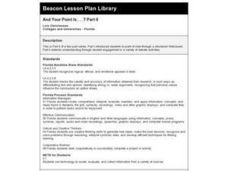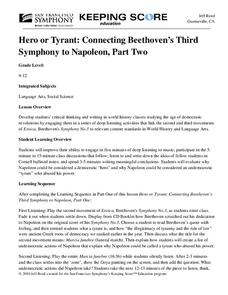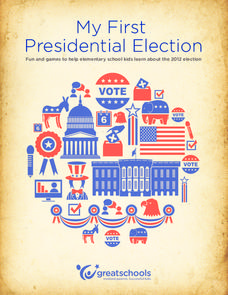Curated OER
Armenian Genocide
As your historians examine the beginnings of WWI, ensure they are familiar with the Armenian Genocide. This basic introductory lesson plan utilizes teacher-led discussion, map analysis, and a Socratic seminar. Not much detail is offered...
Curated OER
Liberty and Security in Contemporary China
Upper graders consider contemporary Chinese economics, political viewpoints, and government. This unit covers a span of several class periods or six days, and engages learners in a variety of skills based activities. They conduct...
The New York Times
Should Anthony Weiner Resign?
The news regarding congressional representative Anthony D. Weiner's scandalous online communications was a hot-button topic in public media in 2011. Use this article to review the timeline of events surrounding the situation, and then...
Agriculture in the Classroom
Growing a Nation: Into a New Millennium 1970-Present
If you want to focus on critical thinking skills, this well-constructed series of activities will challenge your history or agriculture class to evaluate the effectiveness of administrative decisions related to agricultural and the...
National Endowment for the Humanities
Revolution '67, Lesson 1: Protest: Why and How
To some people, protesting is as American as apple pie, but the factors that lead to protests can be as confusing to veteran activists as to today's youth. Revolution '67 explores the riots in Newark, New Jersey as a case study. ...
Curated OER
Integrity and Firmness is All I Can Promise: The Washington Presidency
High schoolers engage in a lesson which addresses George Washington's leadership as President of the United States. They review a variety of letters written by Washington online, and prepare reports for the class.
Curated OER
Final Regents Review: The Middle Ages
A thorough and engaging look at the Medieval time period in Europe, this presentation includes photographs of guild crests, illuminated manuscripts, and historical documents. When coupled with a class discussion on Charlemagne and the...
National Endowment for the Humanities
Revolution '67, Lesson 2: What Happened in July 1967? How Do We Know?
Even in a world in which dozens of participants and curious onlookers record every controversial event, the basic facts of what happened are often in dispute. Revolution '67, Lesson 2 explores 1967 Newark, New Jersey using an examination...
Curated OER
And Your Point Is . . .? Part II
After researching recent community or political issues, paired with a review of proper debate format, class members select a topic, adopt a side, and prepare for a debate. The value in this resource is the review of debate procedures,...
VH1
Lessons for Hight School Music Classes: Lesson 2
Art and music have been vehicles for statements of civil unrest for hundreds of years. Upper graders critically analyze several pop songs or music movements from the 1980s that exemplify politically charged motives. They...
Agriculture in the Classroom
Growing a Nation (1930-1949): From Defeat to Victory, Lesson 2
Using primary source materials including radio broadcasts, films, and interview transcripts, history young scholars gain a better understanding of the Dust Bowl, relief efforts for farmers, and the nation's agricultural past. It includes...
Curated OER
The Dutch
Before seeing this presentation, your class might not have a grasp of the contributions to art, science, and politics made by the Dutch in the 16th and 17th centuries. Comprehensive and engaging, the many images and discussion points in...
Curated OER
Modern Iran (1951 - Today)
Introduce your class to the often-mysterious world of Iran in this informative and engaging presentation. With political, social, and religious upheavals, Iran's recent history is a hot topic in recent news - as is its future. After this...
Curated OER
Saddam Hussein and Modern Iraq
Take your class through a moment in modern history in this presentation, which details the rise of Saddam Hussein and the dynamics between Iraq and its neighbors during the Persian Gulf War and the current Iraq war. Though slightly...
Curated OER
Ancient River Valley Civilizations
Ziggurats, cuneiform writing, the Tower of Babel, hieroglyphics, pyramids, the Great Wall. Launch a unit on ancient cultures, with a presentation that introduces viewers to ancient Mesopotamia, Babylonia, Sumer, Egypt, Indus, and China....
San Francisco Symphony
Hero or Tyrant: Connecting Beethoven’s Third Symphony to Napoleon, Part Two
Was Napoleon a tyrant or a hero? Answers could vary depending on the political point of view. Learners listen to Beethoven's Symphony #3 while considering Napoleon's undemocratic tyranny. They listen to the piece in five parts, each time...
Curated OER
Animal Farm, Chapter 1 Discussion Notes
If you are just starting out with Animal Farm by George Orwell, consider this resource. Titled as discussion notes, you might use these questions in a variety of different ways. The questions and prompts start out simple and gradually...
Great Schools
My First Presidential Election
Register, establish a platform, make campaign speeches, and design campaign advertisements with a study of presidential elections. Young citizens engage in various activities that mimic the election process.
Core Knowledge Foundation
Genetics and the Master Race
How did the beginnings of genetic research influence the Nazi party? A thorough, engaging unit incorporates the work of Gregor Mendel, the study of inherited traits, and the use of racism and discrimination during the Holocaust.
National Constitution Center
Creating Your Own Town Hall Poster
Middle and high schoolers are walking into a world rife with strong political viewpoints and vocal opinions. Help to prepare them for controversial discussions with a activity in which they choose, research, and learn more about a...
West Virginia Department of Education
The Debate - John Brown: Martyr or Madman?
Did he die for a cause, or was he crazy? Although the resource discusses John Brown and West Virginia history, many historical figures have the same reputation. Teach learners about different perspectives and highlight the importance of...
West Virginia Department of Education
Declarations and the Quest for Life, Liberty and the Pursuit of Happiness
Understanding how John Brown got his inspiration from the Declaration of Independence helps learners further understand both West Virginia and United States history. The resource, a standalone, uses worksheets, discussion, and essay...
Great Books Foundation
Discussion Guide for Handmaid's Tale
Great literature discussions are a consequence of carefully crafted questions, interpretative questions that permit more than one response, and responses supported by specific evidence from the text. The discussion questions in a guide...
Great Books Foundation
Discussion Guide for 1984
George Orwell's Nineteen Eighty-Four, published in 1949, can seem strangely prophetic when compared to modern news events and politics. Readers of Orwell's dystopian classic sharpen their critical thinking skills by engaging in...

























